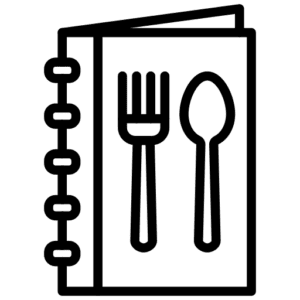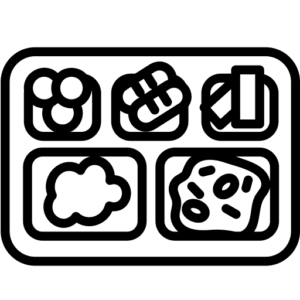
Earn a free micro-certificate with a quick quiz!
Who is this micro-class for
* Waiters and hospitality staff
* House-party hosts
* Guests who follow the Buddhist dietary principles
* What the Buddhist dietary principles are
* How to provide a safe dining experience to guests who follow the Buddhist dietary principles
* Less than 10 minutes to complete
Buddhist food etiquette is the set of rules to appropriately plan a menu and manage the dining experience for guests who follow the Buddhist dietary principles.
1. Be prepared to tend to Buddhist guests

The Buddhism religion does not set dietary laws. However, the principles of the Buddhist faith suggest the avoidance of some foods.
The interpretation of such principles varies by region and Buddhist school. Most people of the Buddhist faith follow a vegetarian, vegan, or lacto-vegetarian diet.
2. Plan an enjoyable Buddhist-friendly menu and dining experience
Avoid traces of forbidden foods and cross-contamination

Follow cooking etiquette principles to cook food safely. Designate specific utensils, cutting boards, and cooking surfaces for Buddhist-friendly dishes, such as vegetarian or vegan dishes.
Create a transparent Buddhist-friendly menu

Clearly mark all the dishes or items on the menu that are appropriate, such as vegetarian or vegan. Label them with a recognized symbol or statement. Make detailed ingredient lists available to customers or guests upon request.
Serve each food on its dedicated plate

Allow your guests who follow Buddhist dietary principles to pick the foods they can eat and avoid the ones they cannot eat.
Avoid serving multiple foods on the same plate. Instead, try to separate them. Assign a plate to each food or ingredient. Serve condiments and sauces separately from food. Present each food with its serving utensils.
Include Buddhist-friendly options for your guests

Some foods present a lower risk of being inappropriate or forbidden. Plan some safe dishes that almost any guest will be able to eat. For instance, baked potatoes or salad are safe options for most guests.
Be open to accomodate the special needs of your guests

Offer ingredient substitutions whenever possible to accommodate guests who follow Buddhist dietary principles. Be transparent about potential substitutions and any extra costs involved.
Be open to customizing dishes and offering a Buddhist-friendly version. Clearly communicate any limitations in customization due to the nature of the dish or kitchen processes.
Avoid foods that may be inappropriate for the Buddhist principles

One of the main principles of Buddhism is nonviolence and the avoidance of suffering. According to this principle, most Buddhists do not eat animals, as doing otherwise would imply killing.
Thus, the meat of any animal is usually excluded from the Buddhist diet.

Buddhists normally do not eat fish, seafood, or shellfish. All of them are considered living beings, and thus eating them implies their killing or suffering.
Dairy products and cheese

Milk, dairy products, and cheese are normally included in the Buddhist diet, as long as their production does not involve any harm to the animal. Nevertheless, in some regions or in some Buddhist schools, milk and dairy are excluded.

Eggs are usually excluded from a Buddhist diet.
Honey is widely accepted.
Vegetables, fruits, and tree nuts

In general, all vegetables and fruits are allowed in the Buddhist diet. However, some Buddhists do not eat plants with a strong smell, such as onion, garlic, or leeks. The belief is that those plants lead to increased emotions, such as anger or sexual desire.

In general, Buddhists can eat any type of grain, such as pasta, couscous, quinoa, and amaranth. The same applies to bakery products and bread. Pizza is allowed too.

Oil, salt, and spices are allowed. Buddhists that avoid alcohol may not consume vinegar made from wine.

A Buddhist diet can include most types of sweets or desserts. However, some interpretations of the Buddhist principles suggest excluding or limiting sugar. First, sugar can be addictive. Second, in the Buddhist faith, many believe that eating food should nourish, but not bring sensual pleasure.
Drinks and alcoholic beverages

A Buddhist diet usually includes soft drinks, tea, and coffee. However, some people consider coffee, tea, and sugar drinks as potentially addictive, and thus avoid them.
In general, most Buddhist diets do not allow alcoholic drinks. However, in some regions, alcoholic drinks are present at religious celebrations. Thus, some Buddhists may consume alcohol.
3. Politely ask your Buddhist guests about their food restrictions

It is perfect etiquette to ask your Buddhist guests about their dietary restrictions. The interpretation and application of the Buddhist dietary principles may differ and may include or exclude different foods.
In written formal invitations, it is sufficient to ask guests to inform the hosts about any dietary requirements. In informal invitations, a simple “Do you follow any diet or have any dietary restrictions?” works. Another option is to ask if guests avoid any food.
Never judge or question someone’s dietary restrictions. Avoid asking additional questions, such as why someone follows a diet. Some guests may be uncomfortable sharing their food restrictions.

Hospitality staff should encourage guests to communicate their food allergies or intolerances when making reservations and upon arrival.
Waiters should ask about food allergies before taking orders, and convey this information to the kitchen.
4. Etiquette for guests who follow Buddhist principles
Clearly communicate your food restrictions

Clearly state with your host if you have any dietary restrictions.
Do not expect a change in the menu based on your needs. As a guest, you do not want to sound entitled. Instead, you can ask if there may be some Buddhist-friendly options for you, such as vegan or vegetarian food.
Do not expect the host to accommodate your requests. However, any considerate host will feel compelled to adjust the menu to your needs.
Politely refuse food that you do not eat

If the host serves a type of food that you do not eat, simply avoid it. If the host or another guest explicitly offers such food to you, politely refuse it. It is enough to say “no, thank you”.
Provide additional details only if someone asks you. Be brief and avoid annoying others with your dietary restrictions.

Do not expect others to adjust their menu or diet to your dietary restrictions. Similarly, at a restaurant, do not expect the other guests to change their food order.
Buddhist food etiquette mistakes

The worst etiquette mistakes for a host are:
- Not accommodating your guests’ needs that are due to Buddhist dietary principles.
- Using the same kitchenware with different foods.
- Asking personal dietary questions.
The worst etiquette mistakes for guests who follow Buddhist dietary principles are:
- Not communicating your dietary restrictions to the host.
- Pressuring others.
- Sharing unsolicited details about your diet.
Test Your Knowledge and Earn a Free Micro-certificate
Earn a free micro-certificate with a quick quiz!
Leave a Reply